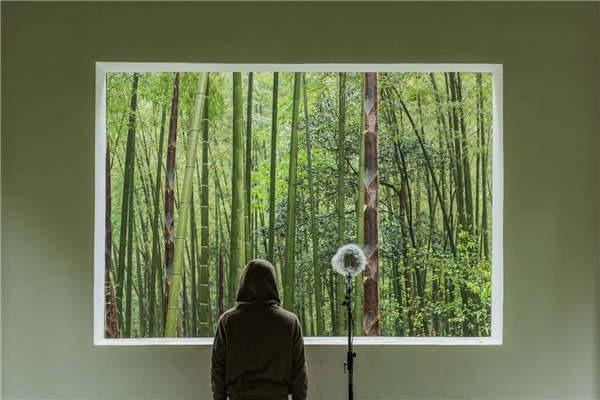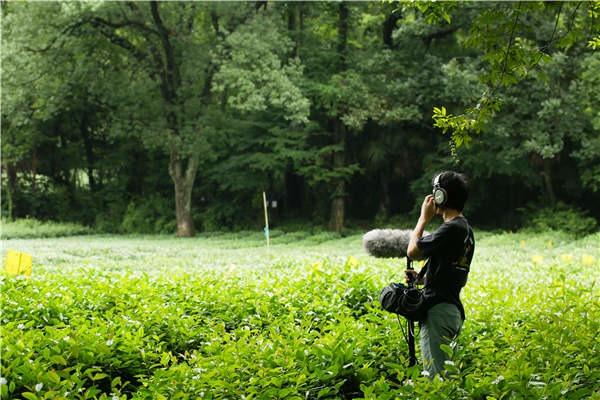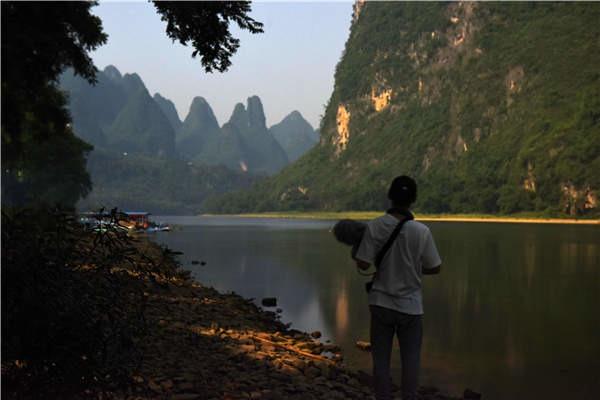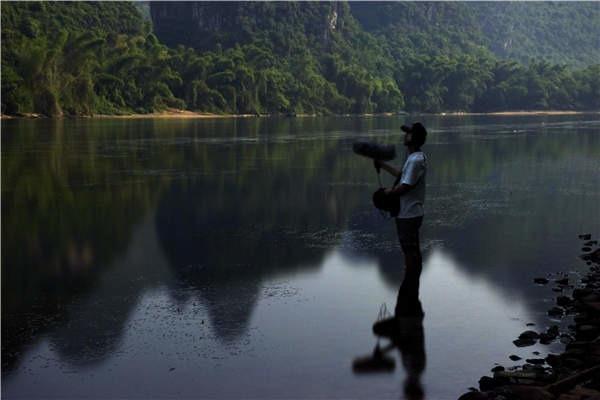 In this April 2016 file photo, Shenggu, a popular podcaster whose real name is Zhao Zhiqin, records sounds of nature in the bamboo forest inYunqi, a small town of Hangzhou, Zhejiang province. (PHOTO PROVIDED TO CHINA DAILY)
In this April 2016 file photo, Shenggu, a popular podcaster whose real name is Zhao Zhiqin, records sounds of nature in the bamboo forest inYunqi, a small town of Hangzhou, Zhejiang province. (PHOTO PROVIDED TO CHINA DAILY)
From the sound of a flowing stream in the forest park or wind in the bamboo groves to the noise of the morning market and the cargo ship on the riverside of Qiantang River, it is now possible to enjoy the beauty of Hangzhou just by closing the eyes and listening.
My recordings are all authentic, so that even though the listener may not necessarily have been to that location, they feel a familiarity when hearing the sound.
Shenggu, podcaster
A recording which captures the myriad sounds of life and nature in Hangzhou's Xihu district of Zhejiang province went online on Ximalaya, a popular audio sharing platform, on July 9.
The album was recorded by Shenggu, whose real name is Zhao Zhiqin and who has been based in Hangzhou for around a decade, a popular podcaster on Ximalaya with over half a million followers.
"I'm honored to help more people discover the beauty of Hangzhou through sound," he says.
He collects the sounds of the wind and rain-even the frogs-at Xixi National Wetland Park, the tea garden in Longwu and Xishan national forest park.
In the recordings, he has also captured the audio of all four seasons to craft a complete sound map of the city. Summer is noisier, the air filled with the buzzing of insects, while the wind in winter sounds dry.
The album, according to the platform, is a new exploration of digitally promoting culture and travel and is free to listen to.
He moved to Hangzhou in 2011, after graduating from Guilin University of Electronic Technology with a major in animation.
At the time, working as a designer at an internet company, he had a"996 schedule"-working from 9 am to 9 pm, six days a week. The stress of work began to affect his sleep.
 In this June 2020 file photo, Shenggu records natural sounds in the woods in Jiuxi, Hangzhou. (PHOTO PROVIDED TO CHINA DAILY)
In this June 2020 file photo, Shenggu records natural sounds in the woods in Jiuxi, Hangzhou. (PHOTO PROVIDED TO CHINA DAILY)
In 2013, he traveled to Fujian during the National Day holiday. It was the first time he had visited the coast and he was so impressed by the sound of the waves that he wanted to record them.
"It was 4 am, the sun was not out yet. I walked on the beach with wind blowing on me," he recalls. "I closed my eyes and felt I wanted to fall asleep. Immediately, I wanted to record it (for future use)."
When he was back in Hangzhou, he took the recorder to the suburbs at weekends to collect the sounds of nature.
People often associate white noise with television static, or the serene sounds of rainfall and crashing ocean waves. White noise creates a masking effect, blocking out those changes in ambient sound that can frustrate and disturb light sleepers, and it has become popular among people whose daily stresses make it difficult to fall asleep.
There are half a million people who listen to the sound of crickets on Ximalaya, while the sound of rain, thunder, wind and birds are also quite popular.
ALSO READ: Young culture fans dress to impress
He likes to record in the morning, collecting the sound of dogs barking, wind blowing, birdsong or the voices of hawkers on street.
He started uploading his recordings to the audio platform in 2015 and, so far, his recordings have been played by listeners over 100 million times.
The sounds Shenggu uploaded reminded many listeners of their hometowns. One message claims that the sound of dogs barking on a farm evoked the childhood memories of the listener.
Of the audio clips, the sound of rain has proved to be the most popular. One such clip, recorded in a small pavilion in Hangzhou Botanical Garden, has been played over 45 million times.
Many of the platform's users have stored that clip in their list of favorites to help them to go to sleep, and one listener commented that they could almost smell the soil when listening to that rain.
 In this undated file photo, Shenggu records natural sounds. (PHOTO PROVIDED TO CHINA DAILY)
In this undated file photo, Shenggu records natural sounds. (PHOTO PROVIDED TO CHINA DAILY)
Water dedicated artist
He has used different materials and fabrics upon which to record the sound of falling rain. Once he recorded the sound of an array mbira-a musical instrument with a unique harp-or bell-like sound-being struck by rain, a decision that resonated with users. "The combination of the array mbira and the rain is like that silky feeling between coffee and milk," one listener commented.
Rain, he notes, is also one of the hardest sounds to record, even though it rains a lot in Jiangnan, the region south of the Yangtze River, as it's all hard to predict-when it is going to rain, how heavy the rainfall and when it will stop. He once drove 50 kilometers to record a thunderstorm but returned empty-handed.
He usually keeps his recorder fully charged, and knows where he wants to record before the rain comes.
While recording the sound of nature, urban noise is an obstacle for Shenggu, such as the sound from cars or airplanes.
ALSO READ: Paralytic artist finds hope painting bottles
It is not just a case setting up the recorder and the microphone.
To record the pure sound of rain, he doesn't wear a raincoat, to avoid catching the sound of the rain hitting the material, and he has to remain still. As a result, he endures mosquito bites and is often left soaking wet.
When it thunders, he tries to get as close to the lightning as possible. Once, while recording at a lake, the thunder and lightning almost occurred right overhead.
He sees the recording work as his second job that he fits in with his main employment at a film and TV service company.
From the sound of stepping on snow in a forest at 1 am, the flowing spring water next to a maple tree at 4 am to a bee buzzing in the shrubs at 6 am, for the past seven years, he has kept exploring more of the sounds of nature around him.
 In this undated file photo, Shenggu records natural sounds. (PHOTO PROVIDED TO CHINA DAILY)
In this undated file photo, Shenggu records natural sounds. (PHOTO PROVIDED TO CHINA DAILY)
Recording the sound of snow is one of his most unforgettable experiences. In January 2018, he went to the mountains near Hangzhou to record the sound of stepping on the snow. He took two pairs of shoes to make two different kinds of sound. He spent an hour recording his steps, the snow falling from leaves onto the ground and the breaking of a branch.
READ MORE: East China fishing town reels in a fortune as livestream hub
Besides Hangzhou, he has recorded his hometown, Guilin, Guangxi Zhuang autonomous region, as well as some cities that he has visited on business trips. He also plans to record the snow in northern China.
He will often take his recording equipment into the forest or to the river just to be a "gourmet" of nature's sound.
"When I bring my recording equipment and walk alone in the woods, I feel the peace in nature and all messy thoughts in my head can be thrown away," he says.
He adds that he will continue to record the sounds of nature, because, as time goes by, some may vanish like those no longer heard in the city, so he wants to preserve them in the recordings.
"My recordings are all authentic, so that even though the listener may not necessarily have been to that location, they feel a familiarity when hearing the sound," he says.


